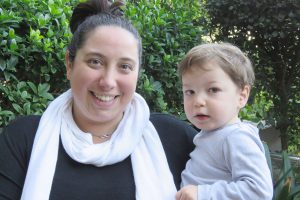One in five new mothers experience perinatal depression and anxiety. So do one in 10 new fathers. That’s 100,000 Australians every year, and suicide is the leading cause of maternal death. Nearly 50% of all new parents experience adjustment disorders and it’s often hidden and not fully understood. These are the facts, and we need to start talking about it so we can better support each other.
Gidget Foundation Australia offers a free video counselling service for new and expecting parents who are experiencing perinatal anxiety and/or depression, and are unable to have a face-to-face consultation. As part of its Start Talking program, parents can receive up to 10 free video counselling sessions.
What is the Gidget Foundation?
Gidget was the nickname of a young mother who tragically took her own life while experiencing postnatal depression. All those close to her were unaware she was suffering so desperately and were devastated by her death. Unfortunately, each year in Australia parents lose their lives to this illness. The tragic loss of Gidget inspired her sisters and friends to establish a foundation in her name, with a passion to care for distressed families and offer them hope.
Gidget Foundation Australia is a not-for-profit organization that provides programs to support the emotional well-being of expectant and new parents.
What is perinatal depression and anxiety?
Perinatal is the period when a person is pregnant and the year after a baby is born. While it can be a uniquely special time, it’ is also a time of great adjustment, and the impact is often underestimated in our society. All expectant and new parents will have their good days and bad days, their ups and downs. But when bad days start to seriously outnumber the good, they may be at risk of perinatal anxiety and depression.
Perinatal anxiety and depression affect almost 100,000 expecting and new parents in Australia each year. It’s a recognized and diagnosable medical condition, the result of biological, psychological, and social factors. Men are not immune to perinatal anxiety and depression. Commonly, but certainly not always, this develops as reactive depression to a partner’s illness — it’s understandably difficult to be around a person who is ‘down’ all the time. In fact, if one parent is depressed, the whole family is affected: partner, baby, and other children.
Perinatal anxiety and depression need to be considered when:
- A parent is experiencing strong emotions which are impacting negatively on their ability to function in the usual way.
- Low moods that have lasted for two weeks or more.
- It’s accompanied by a lack of enjoyment or pleasure in life, and an inability to plan for the future.
Where can I get help?
Parents do benefit from receiving professional help, and they do recover. Early intervention and emotional support enable parents to move on to enjoy this time with their children.
For immediate help, contact PANDA on 1300 726 306 or call Lifeline on 13 11 14.
To contact the Gidget Foundation or to book an appointment with their supportive team, send an email to starttalking@gidgetfoundation.org.au or call 1300 851 758.







